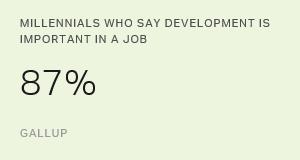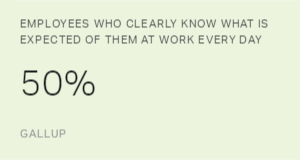Story Highlights
- Millennials have low employee and customer engagement
- Millennials are the most politically independent generation
- 71% use the Internet as their primary news source
Leaders are increasingly turning their attention to the millennial generation, whose attitudes and preferences may profoundly reshape workplaces and society.
In the U.S., roughly 73 million millennials were born between 1980 and 1996. Like those in every generation before them, millennials strive for a life well-lived. They want good jobs -- ones with 30-plus hours of work a week and regular paychecks from employers. They also want to be engaged in those jobs, meaning they are emotionally and behaviorally connected to them.
In addition to finding steady, engaging jobs, millennials want to have high levels of well-being, which means more than being physically fit. Yes, millennials want to be healthy, but they also want a purposeful life, active community and social ties, and financial stability. Regarding that financial stability, millennials want to be able to spend money on what they want -- not just on what they need.
Are millennials getting what they want out of work and life? Not so much.
Gallup's latest report, How Millennials Want to Work and Live, finds that millennials struggle to find good jobs that engage them. Millennials have the highest rates of unemployment and underemployment in the U.S., and only 29% of employed millennials are engaged at work. Half of millennials say they feel good about the amount of money they have to spend, and less than 40% are what Gallup defines as "thriving" in any one aspect of well-being. Their overall well-being nearly matches that of Gen Xers and baby boomers, meaning millennials have not been able to forge better paths for themselves than many Americans have before them. While the dream of all parents is to have their children lead a better life than their own, not all millennials are positioned for such success.
Key Characteristics of Millennials
Millennials are a notably large and diverse group, so it would be a mistake to homogenize them. Yet millennials have common characteristics that can inform a more complete understanding of their behaviors and attitudes. In the course of its research, Gallup has found that four themes collectively describe millennials: unattached, connected, unconstrained and idealistic.
Unattached: More so than the generations before them, millennials are a group without attachments. They do not feel close ties to their jobs or the brands to which they give their money. As noted above, just 29% of millennial workers are engaged in their jobs, while 25% of millennials are fully engaged customers. As employees and consumers, millennials' engagement trails that of other generations.
Millennials are waiting longer to get married, and they are less likely than other generations to feel pride in their communities or to identify with particular religious affiliations or traditional political parties. For example, Gallup data reveal that 44% of millennials say they are politically independent, compared with 37% of Gen Xers, 32% of baby boomers and 26% of traditionalists.
None of this implies that millennials do not want to get married or find groups with which they can relate. But it does suggest that millennials view certain institutions differently than their predecessors do, and those views have shaped their decisions to engage -- or not to engage -- with those institutions.
Connected: Although millennials are generally hesitant or reluctant to embrace brands, employers, their local communities or specific institutions, they are highly connected with the world around them. The introduction and evolution of the Internet, Wi-Fi, laptops and smartphones have enabled millennials to instantly and constantly access entertainment, news, friends, strangers and nearly anything else. According to Gallup, 91% of millennials own a smartphone, and 71% of millennials say the Internet is their main source for news and information. Millennials' hyper-connectedness has helped them gain a unique global perspective and has transformed the way they interact, consume content, browse, buy and work.
Unconstrained: Millennials are pushing for change in the world -- including in the marketplace and the workplace. They don't accept "that's the way it has always been done" as a viable answer. Millennials demand that businesses approach them differently and adjust the customer experience to meet their needs. Their ideal customer experience involves more channels and more digital channels than is true for older generations. In the industries Gallup has studied, the key drivers of customer engagement are largely aligned across generations, but the drivers of online customer engagement diverge among millennials and non-millennials.
Millennials apply the same mindset of "change" to the workplace. They want to be free of old workplace policies and performance management standards, and they expect leaders and managers to adapt accordingly. They see work and life as closely intertwined. Because of this, millennials want to have a different relationship with their manager. They want their manager to care about them as an employee and a person. Gallup has discovered that 62% of millennials who feel they can talk with their manager about non-work-related issues plan to be with their current organization one year from now.
Idealistic: Millennials are a largely optimistic group, and they believe that life and work should be worthwhile and have meaning. They want to learn and grow. A full 87% of millennials say professional development or career growth opportunities are very important to them in a job.
Millennials want to understand how they fit in with their jobs, teams and companies. They look for work that fuels their sense of purpose and makes them feel important. Seventy-one percent of millennials who strongly agree that they know what their organization stands for and what makes it different from its competitors say they plan to be with their company for at least one year.
As a highly educated and technologically connected group, millennials approach the workplace with the mentality, "What's in it for me?" They are the generation most likely to switch jobs and be on the lookout for new opportunities. Millennials want more out of life, and they believe they can get it.
Download How Millennials Want to Work and Live for an in-depth look at what defines the millennial generation as employees, people and consumers.



